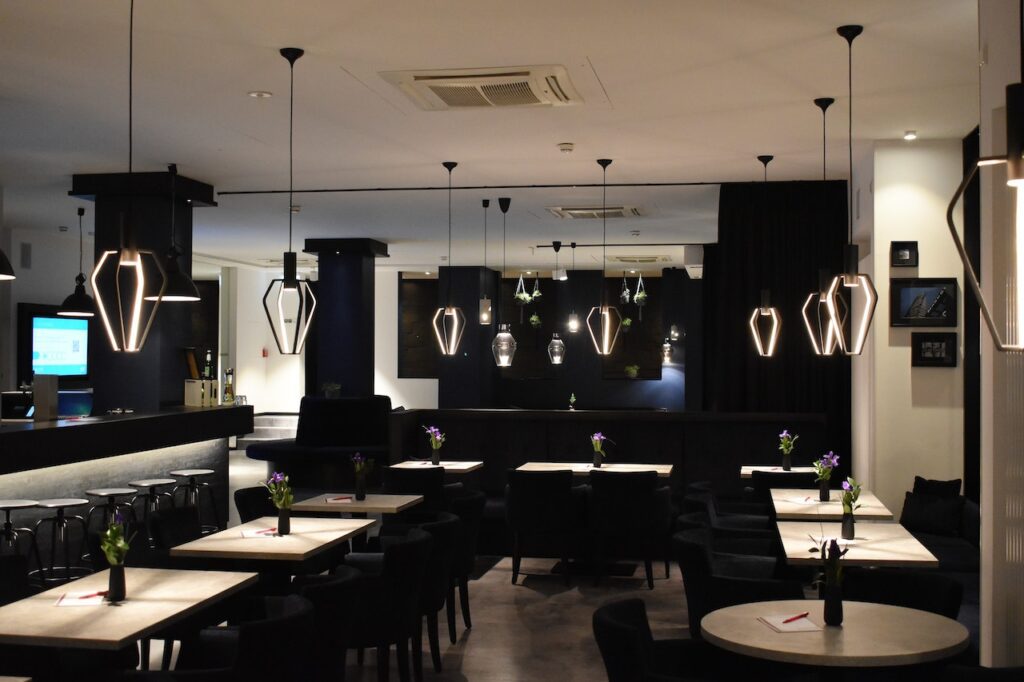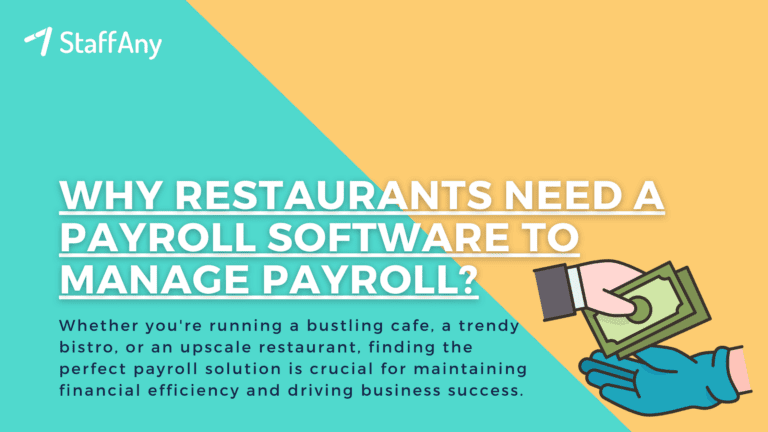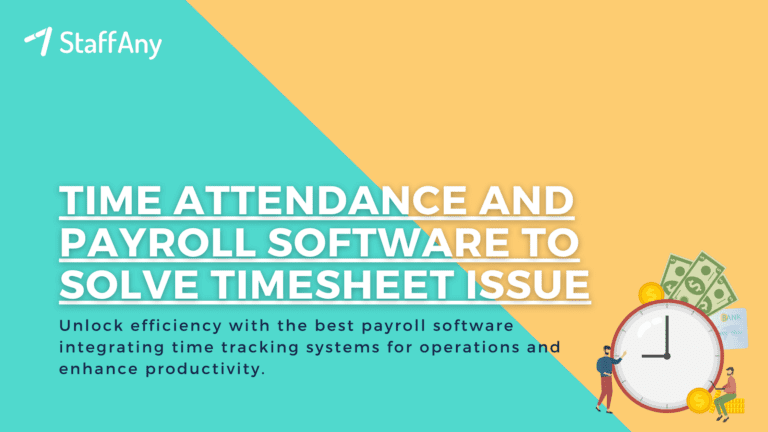As a restaurant owner or manager, having a solid restaurant management plan is essential for the success of your business. A well-developed management plan can help you achieve your goals, streamline operations, and ensure consistency in service and food quality.
In this article, we’ll explore what a restaurant management plan is, the key elements it should include, the benefits of having one, and the steps you can take to develop your own plan. Let’s find out below!
What is a Restaurant Management Plan?

A restaurant management plan is a comprehensive strategy that outlines the goals, objectives, and operational procedures of a restaurant. It covers all aspects of the business, including menu development, marketing, financial management, staffing, and customer service.
A management plan is designed to help restaurant owners and managers make informed decisions and ensure that all employees are working towards common goals.
Read more: 11 Restaurant Risk Management Strategies to Prepare Your Business for Any Crisis
Elements of Restaurant Management Plan
A successful restaurant management plan should include the following elements:
1. Mission Statement
Your restaurant’s mission statement should define your business’s purpose, values, and goals. It should be clear, concise, and reflect the essence of your brand. Your mission statement should guide all decisions you make for your restaurant and should be communicated to all employees.
2. SWOT Analysis
A SWOT (Strengths, Weaknesses, Opportunities, and Threats) analysis will help you identify the internal and external factors that can affect your restaurant’s success. This analysis will help you develop strategies to capitalise on your strengths, mitigate weaknesses, and take advantage of opportunities while preparing for potential threats.
3. Menu Development
Your menu is the core of your restaurant, and it is crucial to your success. Your management plan should include a strategy for menu development, which takes into consideration customer preferences, dietary requirements, and food trends. Your menu should be balanced, offer variety, and be priced appropriately.
Read more: The Importance of Relationship Management with Customers
4. Marketing Plan
Marketing is critical to attracting customers to your restaurant. Your management plan should include a marketing strategy that defines your target audience, advertising channels, and promotional activities. Your marketing plan should also consider your restaurant’s reputation and online presence.
5. Financial Management
Financial management is essential to the success of any restaurant. Your management plan should include financial projections, budgeting, and cost control strategies. Your plan should also outline your payment methods, pricing strategy, and revenue streams.
6. Staffing
Your staff is the face of your restaurant, and they play a crucial role in delivering excellent customer service. Your management plan should include strategies for hiring, training, and retaining staff. It should also cover your staff’s roles and responsibilities, compensation, and performance evaluation.
7. Customer Service
Customer service is an essential component of a successful business in general, especially in the hospitality industry. Your management plan should include strategies for creating a welcoming and hospitable environment, handling customer complaints, and providing an exceptional dining experience.
Benefits of Having a Restaurant Management Plan

Now that we understand what a restaurant management plan is and its key elements, let’s take a closer look at the benefits of having one in place. A well-developed management plan can help your restaurant achieve its goals and succeed in a competitive industry. Here are five key benefits to consider:
1. Streamlined Operations
An effective restaurant management plan can help you streamline your restaurant operations by identifying areas of inefficiency and waste. By optimising your processes, you can reduce costs, increase efficiency, and improve the overall dining experience for your customers.
2. Consistent Quality
Creating restaurant management plans can help ensure that your restaurant consistently delivers high-quality food and service. By setting clear standards and procedures, you can maintain consistency across your menu and service, and build a strong reputation for your brand.
3. Increased Staff Morale
A clear management plan can provide your staff with a sense of purpose and direction, as well as help them understand their roles and responsibilities. By creating a positive work environment and providing training and support, you can increase staff morale and reduce turnover, which can ultimately lead to improved service and customer satisfaction.
4. Better Decision-Making
With a management plan in place, you can make more informed decisions about your restaurant’s future. By monitoring your performance against your goals and using data to guide your decisions, you can adapt to changing market conditions and make strategic choices that position your restaurant for long-term success.
5. Improved Financial Performance
A well-designed management plan can help you manage your finances more effectively by tracking expenses, identifying opportunities for cost savings, and optimising your pricing strategy. Also, by making informed financial decisions, you can improve your profitability and long-term financial health.
Read more: Understanding Manpower Planning and Its Importance in F&B
6. Enhanced Efficiency
Just like a well-trained kitchen crew, a restaurant management plan helps streamline processes and maximizes efficiency. With clear guidelines for inventory management, ordering supplies, and handling peak hours, you can prevent wastage, save costs, and serve those delectable dishes without delay.
7. Crisis Management
Just like a fire extinguisher is a must in the kitchen, a management plan equips you to handle unexpected crises. Whether it’s a sudden staff shortage, equipment breakdown, or external challenges, having contingency plans in place can save the day and your restaurant’s reputation.
8. Growth & Expansion
Dreaming of opening a second location or expanding your menu? A management plan provides a roadmap for growth. It allows restaurant managers to analyze past performance, identify strengths and weaknesses, and make informed decisions about the future.
9. Compliance & Safety
Health inspections and safety regulations can be a little daunting, like navigating a busy Saturday night crowd. But with a restaurant business plan that prioritizes compliance and safety protocols, you can rest easy knowing you’re serving up deliciousness within the legal boundaries.
10. Brand Identity
A restaurant business with a consistent identity stands out in the culinary landscape, just like a signature dish on your menu. A management plan ensures that your brand values, ambiance, and overall experience resonate with customers and keep them coming back for seconds.
Read more: 8 Staff Schedule Management Tips for Business Owners
Steps to Developing Your Restaurant Management Plan

By following these seven steps, you can create a comprehensive plan that provides a roadmap for achieving your goals and building a successful restaurant.
1. Define Your Mission Statement
Start by defining your restaurant’s mission statement to clearly define the purpose and values of your restaurant. It should be concise and reflective of your brand’s essence. Your mission statement will guide all decisions you make for your restaurant, so it’s important to take the time to develop a strong and effective statement.
2. Conduct a SWOT for Market Analysis
Now that you have a clear mission, you can start conducting a SWOT analysis to identify the strengths, weaknesses, opportunities, and threats facing your restaurant. This analysis will help you identify areas for improvement and opportunities to capitalise on, which you can use to inform your food business concept.
3. Develop a Menu Strategy
Your menu is the core of your restaurant, and it’s essential to develop a strategy that considers customer preferences, dietary requirements, and food trends. Your menu should be balanced, offer variety, and be priced appropriately. Developing a menu strategy will help you create a consistent and appealing menu that meets the needs of your customers.
4. Create a Marketing Plan
Your marketing plan should define your target audience, advertising channels, and promotional activities. It should also consider your restaurant’s reputation and online presence. By developing a comprehensive marketing plan, you can effectively promote your restaurant and attract new customers.
Read more: Why Is Employee Engagement Important For Your Business?
5. Manage Your Finances
Financial management is critical to the success of any restaurant. Your plan should include financial projections, budgeting, and cost control strategies. It should also outline your payment methods, pricing strategy, and revenue streams. By managing your finances effectively, you can ensure the long-term success and sustainability of your restaurant.
6. Develop a Staffing Plan
Your staff plays a crucial role in delivering excellent customer service. Your plan should include strategies for hiring, training, and retaining staff. It should also cover your staff’s roles and responsibilities, compensation, and performance evaluation. By developing a staffing plan, you can create a positive work environment that empowers your staff to deliver exceptional service.
7. Create a Customer Service Strategy
Your customer service strategy should define how you create a welcoming and hospitable environment, handle customer complaints, and provide an exceptional dining experience. By developing a customer service strategy, you can ensure that your customers feel valued and satisfied, which can lead to repeat business and positive reviews.
Read more: Understanding the Importance of Human Resource Planning
If you’re ready to start implementing a restaurant management plan and want to streamline your staffing process, consider StaffAny’s online timesheet tracker.
With this tool, you can easily track your staff’s time and attendance, manage scheduling and payroll, and generate insightful reports that can help you optimise your operations. Contact us here to get started!











